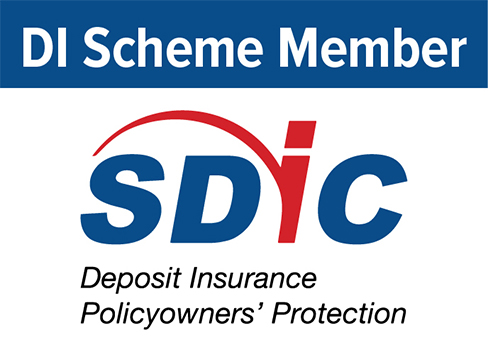
Retail Cheque Processing Charges
In the transition towards becoming a digital nation, a vast majority of individuals and businesses have adopted digital payment methods.
With decreasing cheque usage in Singapore, the average cost to process a cheque transaction is projected to increase steadily in the future.
From 1 November 2023 onwards, banks with significant depositor base in Singapore will introduce cheque processing charges as an industry-wide measure to better reflect the increasing cheque processing costs.![]()
New Cheque Processing Charges
Cheque processing charges will be introduced in phases to give you time to transit to alternative payment modes. The charges will be applicable for all current and savings accounts, and CashPlus account.
- SGD Cheques
- Until 31 October 2023
- From 1 November 2023
| SGD Cheques | Until 31 October 2023 | From 1 November 2023 |
| Cheque Issuance | Free | S$0.75 each |
| Cheque Deposit | Free | Free for at least 6 months |
- SGD Cheques
- Until 31 October 2023
- From 1 November 2023
| USD Cheques | Until 31 October 2023 | From 1 November 2023 |
| Cheque Issuance | Free | US$0.55 each |
| Cheque Deposit | Free | Free for at least 6 months |
Cheque issuance refers to UOB cheques issued by you and debited from your UOB account. The cheque issuance charges for SGD cheques and USD cheques will be applicable for cheques presented from 1 November 2023 onwards, regardless of the cheque issuance date. Cheque issuance charges will be waived if the UOB accountholder is or will be 60 years old and above at the time of cheque presentment. The age of the accountholder will be derived based on the birth year of the accountholder. The waiver is temporary until 31 December 2025.
Cheque deposit refers to cheques credited into your UOB account, regardless of whether the cheques are issued by individual or corporate accountholders. As various government agencies and organisations progressively adopt alternative payment methods such as PayNow, we will not be implementing cheque deposit fees during this transition period, for a minimum of 6 months. Customers will be informed of any changes regarding this arrangement.
Updated as at 19 October 2023.
Alternative Payment Methods
Go chequeless with these payment features on UOB TMRW and Personal Internet Banking!
FAST
Conveniently transfer funds between UOB accounts or to a 3rd party bank. FAST is a free funds transfer service that allows you to transfer funds almost instantly between accounts of the participating bank and non-financial institutions (NFI) in Singapore.
Frequently asked questions
1. What are the new cheque processing charges?
For individual issuers of SGD and USD cheques, a cheque issuance charge will be levied for each cheque presented from 1 November 2023, regardless of the cheque issuance date. This charge will be waived if the UOB accountholder is or will be 60 years old and above at the time of cheque presentment. The age of the UOB accountholder will be derived based on the birth year of the accountholder. This waiver is temporary until 31 December 2025.
For cheques deposited by payees after the applicable cut-off time on 31 October 2023, they will be processed on the next working day, and the cheque issuance charges will be applicable. Please refer to prevailing cheque cut-off time here.
2. Why are cheque processing charges being introduced?
3. Are these new cheque processing charges applicable to me?
These new charges are applicable to all individual customers who utilise cheques, including Personal Banking, Wealth Banking, Privilege Banking, Privilege Reserve, and Private Banking customers.
4. When are the cheque issuance charges applicable?
Cheque issuance charges apply to cheques issued from any UOB current account and/or CashPlus accounts. The charge will apply and be debited from your account once the cheque withdrawal transaction is posted to your account.
Cheque deposit charges apply to cheques deposited into any UOB current or savings accounts, CashPlus accounts and such other accounts that we may include in the future. The cheque deposit service will continue to be free after 1 November 2023 for at least 6 months.
5. Will you reflect the cheque processing charges on my account statements?
Yes, the applicable charge will be reflected separately as “Cheque Charges” after each cheque withdrawal transaction is posted to your account. The charge will be levied on the same day the cheque withdrawal transaction is posted.
6. Will I still be charged a cheque book request fee?
Yes, the cheque book fee continues to be applicable when you order a new cheque book. Each SGD cheque book will be charged S$10 for Personal Banking customers. You may refer to Deposit Fees and Charges for more information.
7. Will I be able to request for a Cashier’s Order in the future?
Yes, you may continue to request for the issuance of a Cashier’s Order through any of our branches or via Personal Internet Banking subject to the prevailing Cashier’s Order issuance charge as set out below:
Issuance at branch - S$5
Issuance via Personal Internet Banking - S$3
The new cheque issuance charges do not apply to Cashier’s Orders.
8. Will I be charged for re-presentment of cheques issued by me?
Yes, you will be charged for the re-presentment of your cheques.
If the initial cheque issued by you was returned for payment, and the payee subsequently re-presents the Image Return Document of that same cheque for payment, you will be charged the applicable cheque issuance charge for the re-presentment.
Please ensure the cheque is not post-dated and your account is sufficiently funded to avoid dishonored cheques.
9. When will the cheque deposit charge take effect?
The cheque processing charges will be introduced in phases. Cheque deposit service will continue to be free after 1 November 2023 for at least 6 months.
We will release additional information closer to the date to give you additional time to inform your payees to transit to alternative payment modes such as FAST, PayNow or GIRO.
10. How can I make payment to UOB credit card and loan accounts without cheques?
You may refer to the respective product pages below for various repayment modes. Cheque-less repayment modes are available.
11. Must I be 60 years old when I issue the cheque to qualify for the waiver?
The cheque issuance charge will only be waived if the UOB accountholder is or will be 60 years and above at the time the cheque is presented.
For the purposes of charge waiver, the accountholder’s age is determined based on his/her year of birth.
For example, if the birthday of the UOB accountholder is 15 December 1963, and the cheque issued is presented on 2 November 2023, the cheque issuance charge will be waived because the accountholder will be 60 years old in the year 2023.
If the birthday of UOB accountholder is 15 June 1964, and the cheque issued is presented on 3 January 2024, the cheque issuance charge will be waived as well as the UOB accountholder will be aged 60 in the year 2024.
If the birthday of UOB accountholder is 15 June 1965, and the cheque issued is presented on 3 January 2024, the cheque issuance charge will not be waived as the UOB accountholder is only aged 59 in the year 2024.
12. For joint accounts, is the charge waiver based on the cheque issuer's age?
In the case of joint accounts, so long as any one of the accountholders is or will be aged 60 years and above at the time of cheque presentment, cheques issued from that account will be eligible for the cheque issuance charge waiver even though the cheque may have been signed by the accountholder(s) who is/are below the age of 60 at the time the cheque is presented.
If the primary accountholder is 60 years old and the secondary accountholder is 50 years old, the cheque issuance charge will be waived even if the cheque was signed singly by the secondary accountholder in accordance with that account’s operating mandate.
13. How can I transact above Personal Internet Banking daily transfer limit?
We recommend that you plan your payment needs in advance and stagger the payments over a few days through FAST or PayNow, which is free of charge.
The maximum daily transfer limit differs based on your banking segment as set out below:
Personal & Wealth Banking - S$100,000
Privilege Banking & Privilege Reserve - S$200,000
If you need to make payment urgently in an amount that is above your daily transfer limit, you may still issue a cheque subject to payment of the cheque issuance charge, or proceed to the nearest UOB branch to perform a MEPS+ transfer subject to prevailing charges.
14. What are the alternatives besides digital payment modes?
You may consider using your ATM or Debit Card for fund transfer at UOB ATMs island wide, which is instant and free of charge. Please refer to steps to access FAST on ATM here.
Your ATM or Debit Card may also be used on AXS Stations for bill payments. For recurring bill payments, you may apply for GIRO payments with your billing organisation.
Deposit Insurance Scheme
Singapore dollar deposits of non-bank depositors and monies and deposits denominated in Singapore dollars under the Supplementary Retirement Scheme are insured by the Singapore Deposit Insurance Corporation, for up to S$100,000 in aggregate per depositor per Scheme member by law. Monies and deposits denominated in Singapore dollars under the CPF Investment Scheme and CPF Retirement Sum Scheme are aggregated and separately insured up to S$100,000 for each depositor per Scheme member. Foreign currency deposits, dual currency investments, structured deposits and other investment products are not insured.
Please refer to UOB Insured Deposit Register for a list of UOB accounts / products that are covered under the Scheme.











